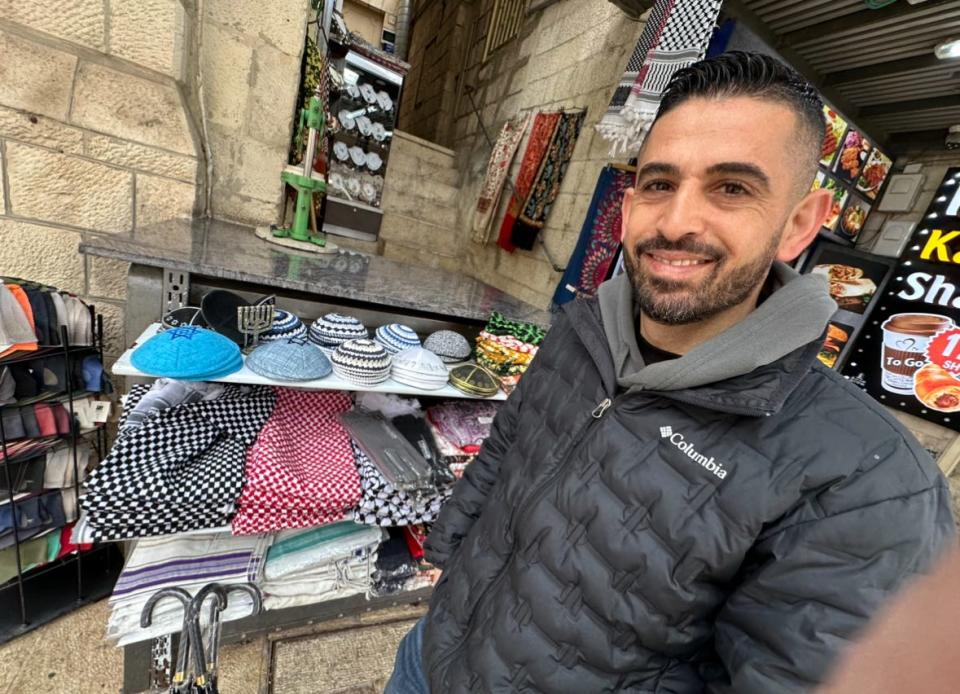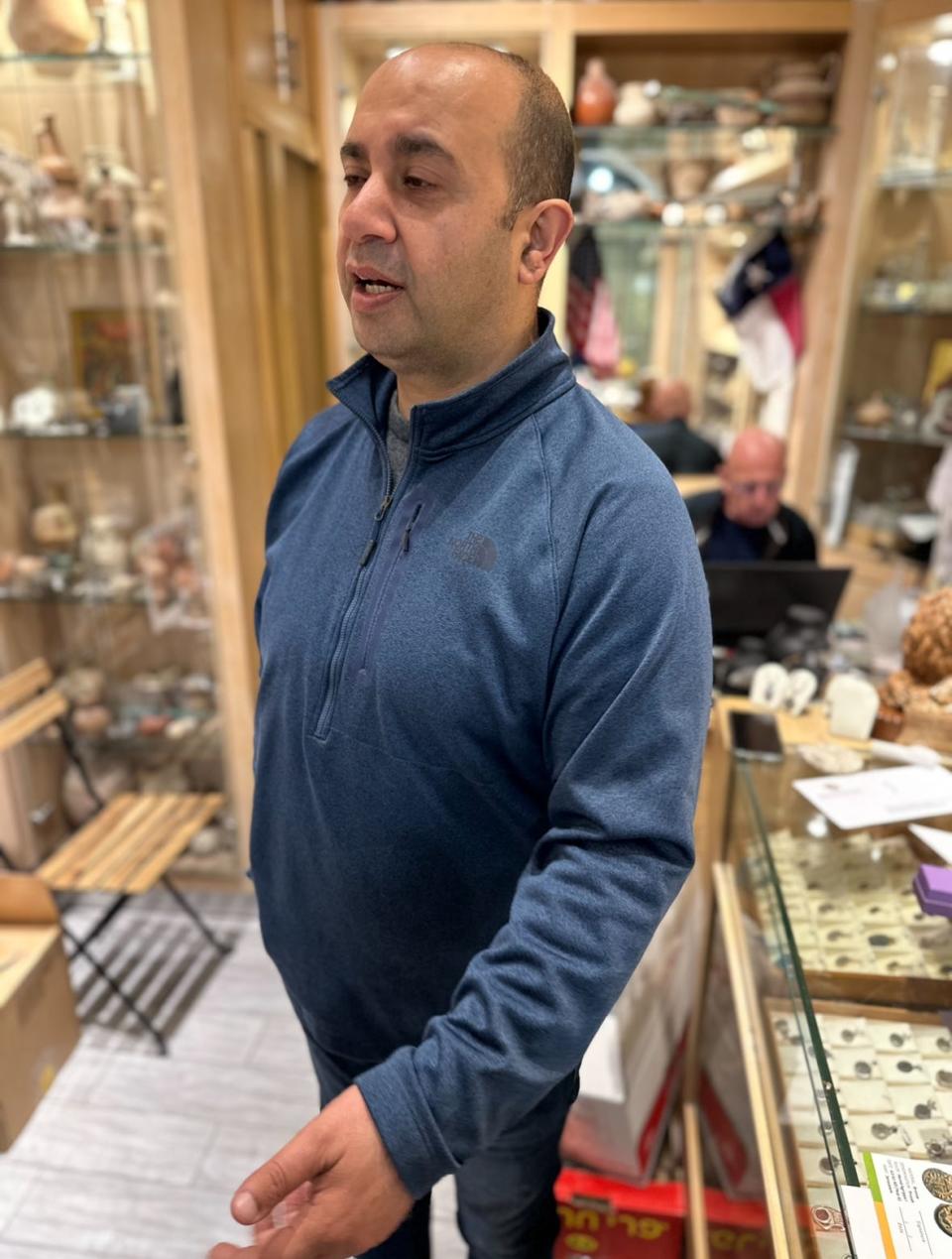Mark Patinkin in Israel: Walk through Jerusalem reminder of why Arab and Jew hold onto it so
One last time before I leave Israel, I am drawn to the Old City, to feel its spirit and hear its voices during this difficult moment.
Voices like Ahmed’s.
He owns one of the first stores beyond the Jaffa Gate, his wares implying a message of hope. He sells crosses for Christians, Hamsa hands for Muslims and Stars of David for Jews.
He’s among the few staying open after what war has done to tourism here, so Ahmed welcomes me.
“May I make you tea?” he says as I pause to look.
It gets me smiling at his merchant skills. One usually isn’t offered tea at The Gap.
“Thank you,” I say, “but no need.”
“Don’t break my heart,” says Ahmed, who is 37. “May I call you brother?”
I notice yarmulkes and keffiyehs side by side, just as I saw Judaica in a West Bank shop near the Church of the Nativity, and it makes you realize how commerce bridges the divide.

I ask how business is.
“Thank God,” Ahmed responds, then adds: “This is what we always say – thank God for good things, and not good things. Thank God.”
“How,” I ask, “are things since the war?”
“I don’t like politics.” Ahmed says. “I believe in people. Like you. I believe a miracle is coming.”
Where is he from?
He tells me he has a Jordanian green card and an Israeli ID.
“It’s complicated here, my brother.”
I make a few purchases, raising Ahmed’s hopes for more. Do I have a wife, girlfriend, daughters or sisters, because look here – so beautiful what he has for them.
Sold – one more item, which gets him offering tea again, but it’s time to move on.
I continue down narrow David Street, which paradoxically goes through the Arab Quarter, a tunnel-like corridor as moody as any ancient path in this world. Then I turn down Christian Quarter Road, a reminder of how tightly woven the faiths are here.
I stop to chat with another Arab proprietor, Awni, 57, asking him about the war.
Business, he says, has been hard.
“We are tired from the politics we have,” he tells me. The Israelis and Palestinians he knows want to live in peace.
Others I speak with say the same.
“Muslim, Jewish, Christian,” says a keeper named Nasser, “the best thing is we live together.”
I continue past the Church of the Holy Sepulchre, built 1,700 years ago by the Roman Emperor Constantine on the spot where Jesus was laid to rest and then rose. Opposite its courtyard is the Mosque of Omar, from the 1400s, and close to both, of course, the Western Wall itself.
That is what Jerusalem is.
A Yeshiva student walks by in a bit of a hurry, saying he’s on his way to study Talmud.
Just one question then – what does he think of the war?
“The people of King David,” he says, “are fighting for our land.”
As he rushes on, I turn into the noted Zak’s Antiquities shop, its proprietor, Zak Mishriki, telling me he’s weathered things by having long sold his inventory online as well as here.
“Tourism is a sensitive industry in this crazy country,” says Zak.
Is he Muslim or Christian?

“It’s a difficult question during the war,” he says. Which tells you more than if he’d answered.
What does he think of the conflict?
“It’s the outcome of religion,” says Zak. For too long, faiths have fought.
One challenge, he tells me, is there is no shared view of the war. Being multilingual, Zak reads news in Arabic, Hebrew and English, and each has a different version.
His family has called Jerusalem home for four centuries, but he only recently became an Israeli citizen.
What was he before that?
He had Jordanian nationality even though he’s never been to Jordan.
And again I see how complicated it is here.
Zak offers another example of that: there are Jews here whose ancestors arrived from Sanaa in the 1800s, and if you ask who they are, they’ll first say Yemenites.
But Zak is glad to call Jerusalem home.
“It’s less crazy than Europe soon,” he says.
Soon? Does he mean with Islamic extremism emerging there?
“And right wing too. Here, we’re trying to coexist.”
When folks ask his background, does he say he’s an Israeli or Palestinian?
“I say Jerusalemite,” says Zak. “To avoid myself from the politics.”
As for the war, he puts it in history’s context.
“We have seen what happened with the Crusaders, with the Caliphates,” he says, “we have seen a lot.”
And now again.
I buy items from him too, then continue to the nearby Greek Orthodox enclave, at one point pausing by some intriguing history – the world’s oldest tattoo shop, called Razzouk, its forebears having inked the skin of Crusaders during the 1300s.
As I continue through the area’s Greek patriarchate, my eye goes to an ancient iron doorway, a small opening reminding of what one might find in a ship. A white-bearded Greek Orthodox priest appears in black, declining to speak, but happy to pose for me in a tableau evocative of the Old City.

The Patriarchate began after the time of Jesus, faced challenges when the Romans destroyed the city in the year 70, then found renewal in the fourth century’s time of Byzantine emperors.
It is the story of this place, peoples falling and rising over the millennia, but somehow, impossibly, enduring.
Today, it is Arab and Jew whose struggle defines Jerusalem.
And, you think, of course there is some kind of struggle, this being the most contested place on earth, invaded, captured, lost and reconquered almost 50 times.
Which is why Arab and Jew hold onto it so.
The latest: US Army Reserve promotes sergeant killed in Jordan drone attack
It’s where their prophets walked, their ancestors died, and today their brethren are dying yet again.
And you realize as you leave how much this explains.
After so much sacrifice, millennia of it, how do Arab and Jew let go of such a place?
How?
Mark Patinkin is traveling to Israel personally and is not sponsored by or affiliated with any organization. He will report firsthand from the region as he has done for the last four decades through his award-winning journalism. He can be reached at mpatinki@providencejournal.com.
This article originally appeared on The Providence Journal: Visit to Jerusalem shows Mark Patinkin how complicated it is

